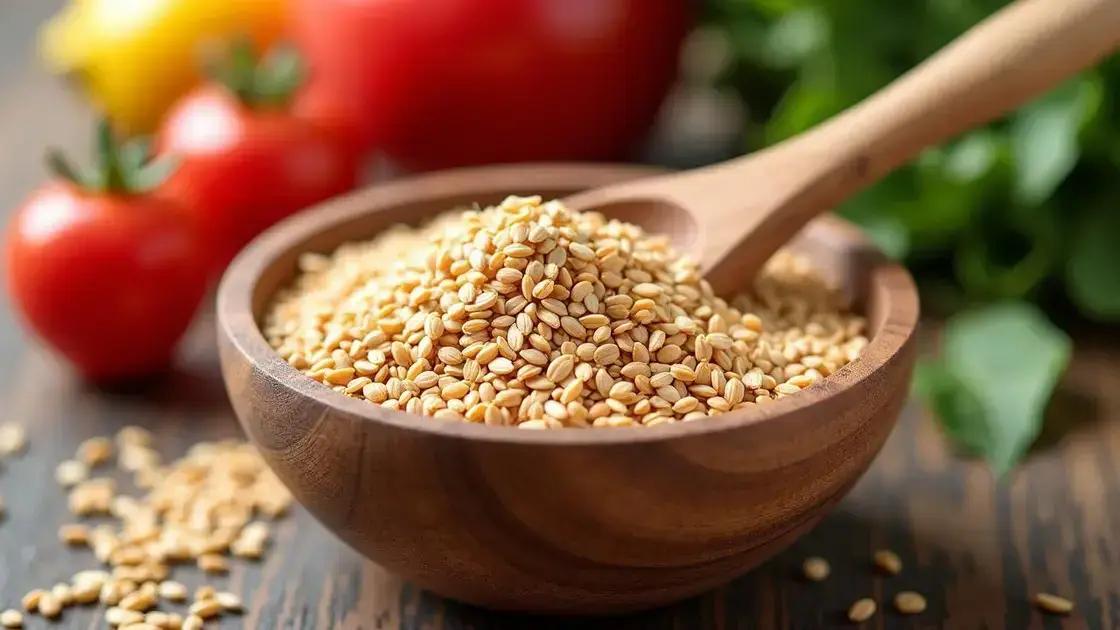Flaxseeds offer numerous health benefits, including support for heart and prostate health due to their high omega-3 fatty acids, fiber, and lignans. Incorporating flaxseeds into your diet is easy through smoothies, baked goods, or salads, making them a valuable addition to a healthy lifestyle.
Flaxseeds, tiny yet potent, offer incredible benefits for heart and prostate health. Rich in omega-3 fatty acids and lignans, these superseeds can help reduce heart disease risk and support prostate function. In this article, we will uncover the nutritional value of flaxseeds, how they bolster heart health, their vital role in prostate wellness, and practical tips for incorporating them into your daily diet.
Understanding Flaxseeds and Their Nutritional Value

Flaxseeds, often referred to as linseeds, are small, brown or golden seeds packed with nutritional benefits. They are one of the richest sources of omega-3 fatty acids, particularly α-linolenic acid (ALA), which is crucial for heart health. Beyond omega-3s, flaxseeds are loaded with dietary fiber that supports digestive health and can help maintain a healthy weight.
Nutritional Composition of Flaxseeds
A typical serving of flaxseeds, about one ounce (28 grams), provides approximately 150 calories. This serving contains:
- Healthy Fats: 12 grams of fat, mostly unsaturated fat.
- Omega-3 Fatty Acids: 6,388 mg of ALA.
- Fiber: 7.6 grams of dietary fiber.
- Protein: 5 grams of protein.
- Lignans: Flaxseeds contain high levels of lignans, which may offer antioxidant properties.
These nutrients contribute significantly to overall health and wellness, particularly for the heart and prostate.
Health Benefits of Key Nutrients
The omega-3 fatty acids found in flaxseeds play a vital role in reducing inflammation and improving cardiovascular health. Regular consumption can help lower blood pressure and cholesterol levels, promoting a heart-healthy lifestyle. The lignans also support hormonal balance and may protect against certain cancers, including prostate cancer.
Including flaxseeds in your diet can be a simple yet effective way to harness these health benefits. Their versatile nature allows them to be easily added to smoothies, baked goods, and salads, making them an excellent dietary choice.
How Flaxseeds Support Heart Health

Flaxseeds play a remarkable role in supporting heart health. Their high content of omega-3 fatty acids, particularly α-linolenic acid (ALA), is a primary reason for this benefit. Omega-3 fatty acids are known to reduce inflammation in the body, which is linked to heart disease.
Cholesterol Management
Flaxseeds aid in managing cholesterol levels. The soluble fiber in flaxseeds binds to bile acids in the intestines, which can lower LDL (bad cholesterol) levels. A daily intake of flaxseeds may contribute to better cholesterol profiles, lowering the risk of heart-related issues.
Blood Pressure Regulation
Additionally, studies have indicated that regular consumption of flaxseeds may help in reducing high blood pressure. This effect can further decrease the risk of heart disease and stroke, creating a healthier cardiovascular system.
Anti-Inflammatory Properties
The anti-inflammatory properties of omega-3s in flaxseeds can also improve overall heart function. Chronic inflammation is a key risk factor for heart disease, and the omega-3 fatty acids obtained from flaxseeds help combat this.
Incorporating flaxseeds into your diet can be easy and beneficial. They can be added to smoothies, sprinkled on oatmeal, or used in baking. This simple addition can enhance the nutritional value of meals and promote long-term heart health.
Flaxseeds’ Role in Prostate Wellness

Flaxseeds are gaining attention for their potential benefits in prostate wellness. One of the key components contributing to this effect is the high level of lignans found in flaxseeds. Lignans are phytoestrogens, which can help regulate hormone levels in the body, particularly estrogen and testosterone.
Reducing Risk of Prostate Cancer
Research suggests that lignans may lower the risk of developing prostate cancer. They do this by decreasing the availability of testosterone, which is linked to prostate cancer growth. Regular consumption of flaxseeds could be a protective dietary strategy against this disease.
Anti-Inflammatory Effects
The omega-3 fatty acids in flaxseeds also contribute to anti-inflammatory effects. Chronic inflammation is known to be a factor in the development of prostate issues, including benign prostatic hyperplasia (BPH) and cancer. By reducing inflammation, flaxseeds may help maintain prostate health.
Dietary Fiber Benefits
Flaxseeds are an excellent source of dietary fiber, which promotes healthy digestion and regular bowel movements. Healthy bowel function is important as it can contribute to a decreased risk of certain gastrointestinal issues that may affect prostate health.
Incorporating flaxseeds into meals is simple; they can be added to smoothies, yogurt, or baked goods. This not only enhances the nutritional profile of your diet but also supports prostate wellness.
Incorporating Flaxseeds into Your Diet

Incorporating flaxseeds into your diet is simple and beneficial. These tiny seeds can be added to many foods, enhancing both nutrition and flavor. Here are some easy ways to include flaxseeds in your daily meals:
Add to Smoothies
One of the easiest ways to consume flaxseeds is by adding them to smoothies. Just blend a tablespoon of ground flaxseeds with your favorite fruits, vegetables, and liquids. This boosts your smoothie with omega-3s and fiber.
Sprinkle on Breakfast
Flaxseeds can be sprinkled on top of your morning cereal, yogurt, or oatmeal. This adds a pleasant crunch and nutritional value without changing the taste.
Baking with Flaxseeds
When baking, you can substitute some flour with ground flaxseeds. For example, use 1/4 cup of ground flaxseeds in place of 1/4 cup of flour in recipes for muffins or pancakes. This not only improves nutritional content but also makes the baked goods moist.
In Salads and Dressings
Adding whole or ground flaxseeds to salads provides an extra texture and health benefits. You can also mix ground flaxseeds into salad dressings for a nutritional boost.
Mix into Soups and Stews
Stirring in ground flaxseeds into soups or stews can thicken the consistency and add fiber. It’s a great way to enhance the nutritional value of hearty dishes.
Start with small amounts and gradually increase to ensure your body adjusts to the extra fiber. Enjoy the versatile benefits of flaxseeds in delicious, simple ways!
Incorporate Flaxseeds for a Healthier Life
Flaxseeds offer amazing benefits for both heart and prostate health. Packed with omega-3 fatty acids, lignans, and dietary fiber, they play a vital role in supporting overall wellness.
By understanding their nutritional value and how they promote heart health and prostate wellness, you can appreciate their importance in your diet. Various easy methods to incorporate flaxseeds into daily meals can enhance both taste and nutrition.
Try adding flaxseeds to smoothies, cereals, baked goods, and salads to harness their potential. Making flaxseeds a regular part of your diet can lead to a healthier lifestyle.
Embrace the power of flaxseeds and take a proactive step towards better health!
FAQ – Frequently Asked Questions about Flaxseeds and Health
What are the health benefits of flaxseeds?
Flaxseeds are rich in omega-3 fatty acids, fiber, and lignans, which support heart health, digestive health, and may reduce the risk of prostate cancer.
How can I incorporate flaxseeds into my diet?
You can add flaxseeds to smoothies, sprinkle them on cereal or yogurt, include them in baked goods, or mix them into salads and soups.
Should I use whole or ground flaxseeds?
Ground flaxseeds are more nutritious because they allow for better absorption of the omega-3s and nutrients compared to whole seeds.
How much flaxseeds should I consume daily?
A common recommendation is to consume about 1–2 tablespoons of ground flaxseeds daily for optimal health benefits.
Are there any side effects of consuming flaxseeds?
Generally, flaxseeds are safe; however, consuming too many may cause digestive discomfort due to high fiber content. It’s best to start with small amounts.
Can flaxseeds help lower cholesterol?
Yes, the soluble fiber in flaxseeds can help lower LDL (bad cholesterol) levels, contributing to a healthier cholesterol profile.













